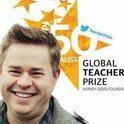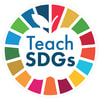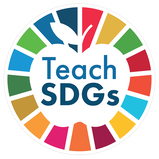|
By Mark Reid, Arts Educator & 2013 MusiCounts Teacher of the Year, @mmgreid How often do we pass up on opportunities for professional growth because it “probably doesn’t apply” to what we do? It seems as though we pass up these opportunities because we’re looking for a ‘professional supplement’, a quick how-to or lesson we can take to school the next day. Don’t get me wrong, these can be helpful in many cases. Professional development, however, is about growing capacity for creative practice, innovative instruction, and emerging opportunities to connect learning to today’s world. Thinking about Arts Education, it can be uncomfortably common for arts learning to be left out of the conversation on high-profile trends in education. It’s time for that to change. Arts learning is an opportunity for students to explore ideas and arts-based solutions to problems in our world. The Sustainable Development Goals (SDGs) need a rich diversity of supporters and activists to facilitate their reach -- and Arts Educators are well-equipped to take action. Thinking globally, the ideas below come from some leading arts educators around the world. Each was tasked with providing examples from their teaching area that link with the SDGs. These are topics to be woven into instruction that introduce the SDGs to your students and empower their use of the arts to change the future of our world. I also hope you’ll see these examples not as absolutes, but as possibilities that contribute to your professional development and growth! It is important to note that ‘art’ is intended to refer to any artwork created or imagined in the context of dance, drama, music, or visual arts. To connect with these and other colleagues, reach out on Twitter using #TeachSDGs! ●Dance - Mike Wamaya, Kenya (@mikewamaya) ●Drama/Theatre - Estella Owoimaha-Church, United States (@eochurch) ●Music - Mark Reid, Canada (@mmgreid) ●Visual Art/Design - Merit Karise, Estonia
● Discuss nutrition for dancers, with a connection to service-learning that fights youth hunger ● Engage in scriptwriting that addresses malnourishment as an issue of global equity ● Participating in the creation of music, dance, drama, and visual art has a therapeutic impact on daily life ● Physical activity in dance or drama ● Practicing body positivity in casting and piece selection ● Employ mental wellness techniques in training for dance, drama, and music (e.g., meditation, breathing exercises, etc.) ● A comprehensive education includes learning in the arts ● Investment in facilities, equipment, and resources that make learning easier and accessible for all ● How can more students access rigorous arts education opportunities? ● Current topics about equality in music - why are there so few women conducting major orchestras around the world? ● Maternal health and sustainable careers for women in dance ● Alternative casting, script adaptation, and creating roles for students of any gender ● Where does the paint go when you wash it down the drain? ● Make use of eco-friendly paint, dye, and other artmaking materials ● Equip facilities or spaces with renewable energy sources; energy efficient equipment ● Design kinetic artwork that runs on clean energy sources (e.g., wind) ● Mapping skills, interests, and career opportunities ● Combining arts learning with entrepreneurial skill development ● Maintain a collection of student work, performance, and progress ● Make connections with local creative industries for work experience and service-learning ● Habits of professionals in various arts disciplines ● Innovative artists, designers, and those who use art to respond to social issues ● Discuss public policy that support arts, policymakers who champion ● Prepare students to be arts advocates and ambassadors in the community ● Explore and exchange composer music from underrepresented regions, languages, and cultures ● Inclusive design that is mindful of accessibility challenges for students or an audience ● Create roles for all individuals and create inclusive spaces ● Employ alternative casting for classic and contemporary shows ● Incorporate leadership, community performance, and local service-learning activities into rehearsal, performance, and student travel experiences ● Pro-active maintenance to extend the lifespan of instruments and equipment ● Diverting waste materials away from the landfill by inventing instruments, props, or costumes ● Giving objects more than one purpose to reduce waste (e.g., edible cutlery design) ● Site-specific or outdoor theatre that doesn’t require energy-hungry lighting systems ● Kinetic or solar panel art/design ● Younger students can envision a healthy living environment for Raffi’s Baby Beluga ● Seek design opportunities influenced by aquatic environments ● Folk songs and folk music traditions often describe life on land ● Incorporate organic and natural materials into scenic design ● Studying and performing anthems of various nations, the Olympic Hymn, and songs of international peace ● Explore and reflect on dynamics of power, structures, systems, and the pursuit of peace and justice ● Study, produce, or write plays that prioritize notions of peace ● Create art that captures messages of social justice, peace, and a better world ● Power of music and musicians to inform their audience about changing the world ● Power of theatre, actors, and playwrights to inform audiences on global issues, opportunities for change, and participation in efforts to change the world  Mark Reid is Arts Education Coordinator at the British Columbia Ministry of Education. He is the former Director of Bands & Choirs at Vancouver Technical Secondary School, 2013 MusiCounts Teacher of the Year, and a Finalist for the 2015 Global Teacher Prize. Mark holds degrees from VanderCook College of Music (MMEd) and the University of Victoria (BMus). In 2016, Mark is pleased to be the Guest Conductor for Vancouver’s Cor Flammae, while teaching a graduate course at VanderCook College of Music. He is a global advocate of #TeachSDGs. Comments are closed.
|
AuthorSTeachSDGs Team & Contributors Archives
November 2019
Categories |


 RSS Feed
RSS Feed